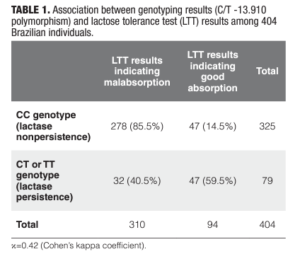HIGHLIGHTS
- Lactose intolerance is highly prevalent and may be implicated as a cofactor, or as a differential diagnosis, in many gastrointestinal conditions.
- The C/T-13910 polymorphism in lactase persistence is well characterized in Caucasian populations for lactase persistence.
- Concordance between genotyping and functional tests does not occur in all patients.
- Brazil has a highly mixed population and knowledge regarding presence of other polymorphisms is of importance in clarifying difficult cases.
ABSTRACT – Background –
Lactose tolerant test (LTT) is the most broadly used diagnostic test for lactose intolerance in Brazil, is an indirect, minimally invasive and a low-cost test that is widely available in primary care and useful in clinical practice. The C/T-13910 polymorphism in lactase persistence has been well characterized in Caucasian populations, but there are no studies evaluating the concordance between C/T-13910 polymorphism genotyping results and LTT results in Brazil, where the population is highly mixed. Objective – We aimed to evaluate agreement between presence of C/T-13910 polymorphism genotyping and malabsorption in LTT results. Methods – This is a retrospective analysis of a Brazilian population whose data were collected from a single laboratory database present in several Brazilian states. Results of individuals who underwent both genetic testing for lactose intolerance (C/T-13910 polymorphism genotyping) and an LTT from April 2016 until February 2019 were analysed to evaluate agreement between tests. Groups were classified according to age (<10-year-old (yo), 10–17 yo, ≥18 yo groups) and state of residence (São Paulo or Rio Grande do Sul). Results – Among the 404 patients evaluated, there was agreement between the genotyping and LTT results in 325 (80.4%) patients and discordance in 79 (19.6%) patients (k=0.42 -moderate agreement). Regarding the genotype, 47 patients with genotype C/C (lactase nonpersistence) had normal LTT results, and 32 with genotype C/T or T/T (indicating lactase persistence) had abnormal LTT results. Neither age nor state of residence (Rio Grande do Sul or São Paulo) affected the agreement between test results. Conclusion – Considering the moderate agreement between C/T-13910 polymorphism genotyping and LTT results (κ=0.42) in the Brazilian population, we hypothesize that an analysis of other polymorphisms could be a strategy to improve the agreement between genotyping and established tests and suggest that additional studies should focus on exploring this approach.
AUTORES
Marcia Wehba Esteves CAVICHIO, Caio Robledo D’Angioli Costa QUAIO, Wagner Antonio da Rosa BARATELA, Patrícia Marinho Costa de OLIVEIR1 and Soraia TAHAN.


